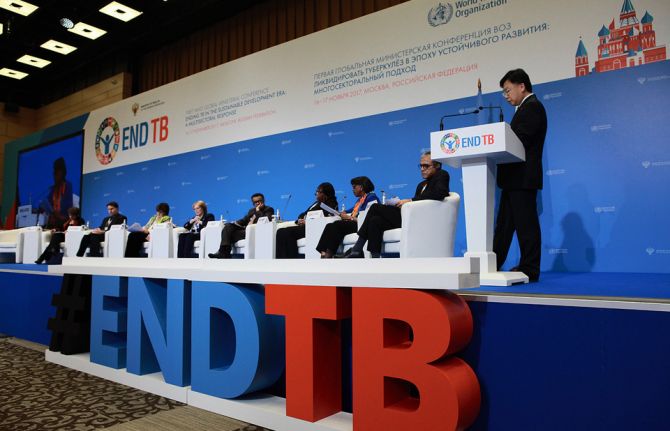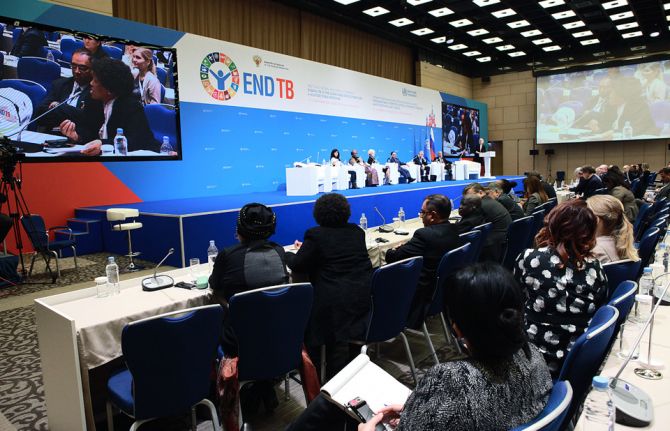



Update
Global ministerial conference ends with adoption of the Moscow Declaration to End TB
23 November 2017
23 November 2017 23 November 2017A global ministerial conference held in Moscow, Russian Federation, on 16 and 17 November that united more than 1000 participants, including 75 ministers and 114 country delegations, concluded with the adoption of the Moscow Declaration to End TB.
The Moscow Declaration to End TB is a new commitment to increase multisectoral action and enhance accountability in the global TB response towards ending tuberculosis (TB) by 2030. The declaration will also inform the first United Nations General Assembly High-Level Meeting on TB, in 2018, which will seek to advance commitments to end TB from heads of state and government.
The declaration outlines the importance of international action to address key areas to respond to TB: sustainable financing, pursuing science, research and development and the establishment of a multisectoral accountability framework.
The conference, the First World Health Organization Global Ministerial Conference on Ending Tuberculosis in the Sustainable Development Era: a Multisectoral Response, was opened by the President of the Russian Federation, Vladimir Putin. It was attended by high-level United Nations leaders, including Amina J. Mohammed, the United Nations Deputy Secretary-General, Tedros Adhanom Ghebreyesus, the World Health Organization Director-General, and Michel Sidibé, the UNAIDS Executive Director.
TB is the world’s leading cause of death from infectious disease—in 2016, 1.7 million people died from the disease—and has profound economic and social consequences. The public health crisis of multidrug-resistant TB continues to deteriorate and TB is the leading cause of death among people living with HIV.
During the conference, Mariam Avanesova, who was treated for multidrug-resistant TB in Armenia from 2010 to 2012 and represents the organization TBpeople, the Eurasian network of people living with TB, handed over the #StepUpforTB petition. The petition is an urgent call for health ministers in key TB-affected countries to ensure that their TB policies and practices are in line with international standards, as defined by the World Health Organization, including testing and treatment of TB and its drug-resistant forms. Initiated by Médecins Sans Frontières and the Stop TB Partnership, the petition has been signed by more than 30 000 people from 120 countries.
Quotes
“We are aware of our responsibility and the extreme importance of this matter, and we are concentrating major efforts and resources to resolve it … reducing mortality from tuberculosis is among our state priorities, along with reducing mortality from cardiovascular diseases and cancer.”
“Tuberculosis is a complex, multisectoral problem that requires a systemic and highly coordinated response to address the conditions that drive the disease. The accountability framework we have agreed to develop marks a new beginning, and with the World Health Organization’s support to coordinate and track progress, we expect the Moscow Declaration to End TB to lead us forward to the high-level meeting of the United Nations General Assembly in 2018.”
“Today marks a critical landmark in the fight to end tuberculosis. It signals a long overdue global commitment to stop the death and suffering caused by this ancient killer.”
“Here in eastern Europe and around the world, HIV programmes need to do much more to find, treat and prevent tuberculosis among people living with HIV.”
“I find it unacceptable that people are dying because either their diagnosis was too late and the medicines didn’t work, or they simply quit because the side-effects from 20 tablets a day for two years were too much. I appeal to all governments to step-up to make timely tuberculosis testing and treatment accessible to all people who need it.”



